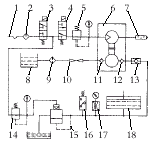Composition and working principle of hydraulic overload protection system
1 System composition and working principle
The hydraulic overload protection system is generally composed of pneumatic pumps, unloading valves, pressure relays, solenoid valves, pressure gauges and other components. As shown below.

1. Air source 2. Lubricator 3, 4. Solenoid valve 5, 14. Pressure reducing valve 6. Pneumatic pump 7. Muffler 8. Oil tank 9. Oil filter 10. Shut-off valve 11, 12. One-way in and out oil Valve 13. Check valve 15. Unloading valve 16. Pressure relay 17. Pressure gauge and buffer valve 18. Hydraulic cylinder
When the height of the die is adjusted improperly or double materials appear, the pressure will be overloaded. At this time, the pressure in the hydraulic cylinder rises sharply, the pressure in the high-pressure chamber of the unloading valve is greater than the back pressure in the back pressure chamber, and the piston is moved downward to open the oil return port, and the hydraulic oil is quickly discharged back to the oil tank. Under the action of the balancer, the slider moves up 20mm to protect the press and the mold from damage; at the same time, the pressure relay and the stroke switch act to cut off the clutch control circuit, and the press stops; the solenoid valves 3 and 4 turn off the air source and quickly exhaust When the air in the back pressure chamber of the unloading valve is dropped, the "normal" indicator is off, the "unloading" indicator is on, and the press cannot be started.
After the fault of the press is eliminated, turn the hydraulic protection switch of the control station to the "reset" position, start the "inching" stroke, and raise the slider to the top dead center. At this time, the solenoid valves 3 and 4 are connected to the air source, and the compressed air enters the lower cavity of the unloading valve, which causes the piston to rise and reset, and closes the return channel of the hydraulic cylinder; Reciprocating movement. As a result, low-pressure oil is sucked into the oil tank and output to the hydraulic cylinder through the check valve, and gradually increased to a predetermined pressure. At this time, the hydraulic pad is reset, the stroke switch of the pressure relay and the unloading valve is activated, the "unloading" indicator of the hydraulic protection is off, the "normal" indicator is on, and the hydraulic overload protection system returns to normal. Turn the hydraulic protection work selection switch to the "normal" position, the press can work normally. Each recovery of the hydraulic overload protection system only takes about 3 minutes, which can meet the requirements of general high-efficiency stamping production.
The hydraulic overload protection system is generally composed of pneumatic pumps, unloading valves, pressure relays, solenoid valves, pressure gauges and other components. As shown below.

1. Air source 2. Lubricator 3, 4. Solenoid valve 5, 14. Pressure reducing valve 6. Pneumatic pump 7. Muffler 8. Oil tank 9. Oil filter 10. Shut-off valve 11, 12. One-way in and out oil Valve 13. Check valve 15. Unloading valve 16. Pressure relay 17. Pressure gauge and buffer valve 18. Hydraulic cylinder
When the height of the die is adjusted improperly or double materials appear, the pressure will be overloaded. At this time, the pressure in the hydraulic cylinder rises sharply, the pressure in the high-pressure chamber of the unloading valve is greater than the back pressure in the back pressure chamber, and the piston is moved downward to open the oil return port, and the hydraulic oil is quickly discharged back to the oil tank. Under the action of the balancer, the slider moves up 20mm to protect the press and the mold from damage; at the same time, the pressure relay and the stroke switch act to cut off the clutch control circuit, and the press stops; the solenoid valves 3 and 4 turn off the air source and quickly exhaust When the air in the back pressure chamber of the unloading valve is dropped, the "normal" indicator is off, the "unloading" indicator is on, and the press cannot be started.
After the fault of the press is eliminated, turn the hydraulic protection switch of the control station to the "reset" position, start the "inching" stroke, and raise the slider to the top dead center. At this time, the solenoid valves 3 and 4 are connected to the air source, and the compressed air enters the lower cavity of the unloading valve, which causes the piston to rise and reset, and closes the return channel of the hydraulic cylinder; Reciprocating movement. As a result, low-pressure oil is sucked into the oil tank and output to the hydraulic cylinder through the check valve, and gradually increased to a predetermined pressure. At this time, the hydraulic pad is reset, the stroke switch of the pressure relay and the unloading valve is activated, the "unloading" indicator of the hydraulic protection is off, the "normal" indicator is on, and the hydraulic overload protection system returns to normal. Turn the hydraulic protection work selection switch to the "normal" position, the press can work normally. Each recovery of the hydraulic overload protection system only takes about 3 minutes, which can meet the requirements of general high-efficiency stamping production.
Easy Electronic Technology Co.,Ltd , https://www.yxpcelectronicgroups.com